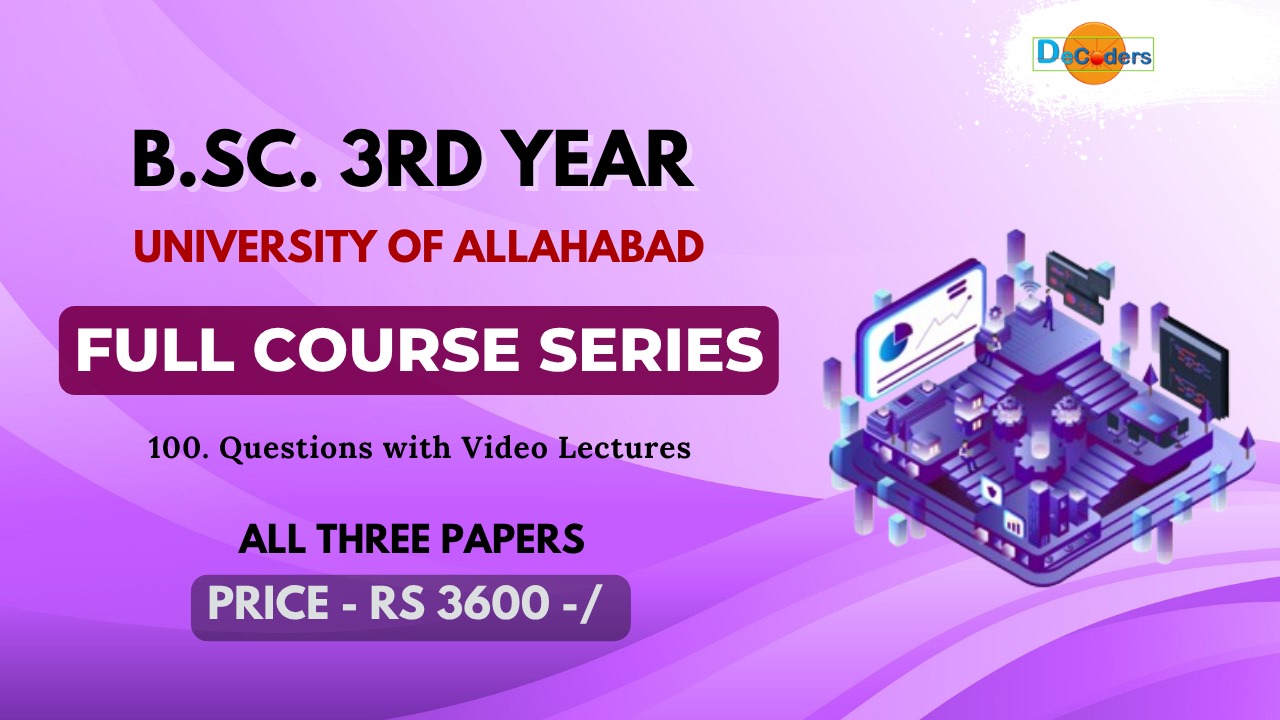Unlock Your Future with Decoders
Get ready to ace BPSC1 with top-notch guidance from the finest teachers across India.
Enroll NowOur Courses

B.Sc. 3rd Year Full Course
B.Sc. 3rd Year Computer Science Course Descriptions 1. Java Programming This course provides in-depth knowledge of Object-Oriented Programming (OOP) using Java, one of the most widely used programming languages in the industry. Students learn the principles of OOP such as classes, objects, inheritance, polymorphism, abstraction, and encapsulation. The course also covers: Exception handling Multithreading File handling GUI development using AWT/Swing Basic networking concepts in Java Objective: To develop strong programming logic and build real-world applications using Java. 2. Database Management Systems (DBMS) This course introduces the concepts and architecture of relational database systems. Students will learn how to design, implement, and manage databases using SQL. Topics include: Data models (Relational, Hierarchical, Network) Entity-Relationship (ER) modeling Normalization Query processing Transaction management Database security Objective: To provide practical skills in data organization, querying, and database system design. 3. Operating Systems (OS) This course covers the fundamental concepts behind modern operating systems. Students will understand how an OS manages hardware and software resources. Key topics include: Process and thread management CPU scheduling Memory management (paging, segmentation) File systems Deadlocks I/O systems Objective: To build a foundational understanding of how operating systems work and how they manage the computer's core functions.
Enroll NowB.Sc. Free Course
In this course, we will provide you with previous years’ question papers and access to selected video resources at no additional cost for B.Sc. 2nd Year Computer Science.
Enroll NowB.Sc. 2nd Year Full Course
1. Computer Organization and Architecture This course provides an understanding of the fundamental structure and functioning of computer systems. It covers the principles of digital logic, the design of basic processing units, memory organization, input-output mechanisms, and instruction execution. Emphasis is placed on understanding how hardware and software interact, how instructions are processed, and how system performance can be optimized. Key Topics: Number systems, logic gates, and Boolean algebra Combinational and sequential circuits CPU organization, instruction set architecture, and addressing modes Memory hierarchy: cache, main memory, secondary storage Input/Output systems and interfacing Basics of pipelining and parallel processing 2. Computer Networks This course introduces the concepts, architecture, and protocols of computer networking. It provides students with knowledge of data transmission techniques, layered communication models, and networking technologies. Students gain insights into how devices communicate across local and wide area networks, as well as the Internet. Key Topics: OSI and TCP/IP reference models Data transmission, encoding, and error detection Switching techniques and multiplexing Network topologies and transmission media LAN, MAN, and WAN technologies IP addressing, routing, and congestion control Transport protocols (TCP, UDP) and application layer protocols (HTTP, FTP, DNS) Basics of network security 3. Data Structures This course introduces techniques for organizing, managing, and storing data efficiently. Students learn the theoretical foundations and practical implementation of data structures that are essential for solving computational problems. Emphasis is on algorithmic design, time and space complexity, and efficient memory utilization. Key Topics: Introduction to algorithms and complexity analysis Arrays, strings, and matrices Stacks, queues, and linked lists Trees: binary trees, binary search trees, AVL trees, and B-trees Graphs: representation, traversal algorithms (BFS, DFS), shortest path algorithms Hashing techniques and hash tables Sorting and searching algorithms
Enroll NowKnow Your Teacher
Meet our experienced instructors who will guide you through your learning journey!

John Doe
Lead Web Development Instructor
John has over 10 years of experience in full-stack web development. He loves teaching modern frameworks like React, Vue, and Node.js.

Jane Smith
Senior Data Science Instructor
Jane has a passion for data science and artificial intelligence. She has worked with top tech companies on large-scale machine learning projects.
Samuel Lee
Mobile App Development Instructor
Samuel is an expert in mobile app development, specializing in both iOS and Android applications. He is passionate about building user-friendly, high-performance apps.
Frequently Asked Questions
Batch Schedule
Upcoming Batches
Web Development - Batch 1
Starts: January 10, 2024
Days: Monday & Wednesday
Time: 6:00 PM - 8:00 PM
Data Science - Batch 2
Starts: February 5, 2024
Days: Tuesday & Thursday
Time: 5:00 PM - 7:00 PM
Mobile App Development
Starts: March 3, 2024
Days: Saturday & Sunday
Time: 9:00 AM - 12:00 PM
Course Highlights
Discover the key features of our courses and how they can help you succeed.
Expert Instructors
- Learn from industry professionals.
- In-depth and practical lessons.
- Years of teaching experience.
Flexible Schedule
- Learn at your own pace.
- Access materials anytime, anywhere.
- Perfect for busy schedules.
Certification
- Receive a verified certificate.
- Boost your career opportunities.
- Globally recognized credentials.
Contact Us
Have questions? Feel free to reach out to us, and we'll get back to you as soon as possible!
Our Contact Details
Email: support@decoders.com
Phone: +916306363113